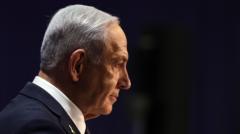The investigation raises tensions as Netanyahu's administration navigates crises in both leadership and public opinion.
**Netanyahu Labels Qatari Investigation a 'Political Witch Hunt' Amid Aide Arrests**

**Netanyahu Labels Qatari Investigation a 'Political Witch Hunt' Amid Aide Arrests**
Israeli Prime Minister faces backlash over probe linking aides to Qatar and amid ongoing protests.
Israeli Prime Minister Benjamin Netanyahu has openly condemned an investigation into alleged connections between his aides and Qatar, labeling it a "political witch hunt" following the arrest of two associates. This investigation, informally dubbed "Qatar-gate," centers on Marianne Urich, a close adviser, and Eli Feldstein, a former communications director, who were detained for suspected financial misconduct involving the Gulf state. Netanyahu, while not directly implicated, stated that the police are effectively using captures as "hostages," adding that there is no substantial evidence against them.
As protests mount against his leadership, fueled by his contentious policies—including his approach to the ongoing conflict with Hamas and efforts to overhaul the judiciary—Netanyahu's situation intensifies. The Israeli Police Department initiated this inquiry amid a court-imposed gag order, leaving few details publicly available. However, media outlets identified Urich and Feldstein as suspected of collaborating with a foreign agent and engaging in illicit financial transactions.
In a rare move, Netanyahu interrupted his own corruption trial, during which he maintains his innocence, to record testimony for police. In an online video release, he accused authorities of executing a politically charged campaign against his administration. Meanwhile, the Likud party issued statements alleging that the attorney general's office is fabricating evidence in an attempt to coerce false admissions.
Despite these allegations, a local magistrate has extended the detention of Urich and Feldstein, citing significant doubts that require further examination. Testimonies suggested that both aides attempted to project a favorable image of Qatar while damaging perceptions of Egyptian mediation efforts. A recording emerged suggesting financial transfers connected to the investigation, which Feldstein's representatives insist were legitimate consultancy fees.
The international context complicates the matter, as Qatar has historically supported Palestinian interests and has facilitated several ceasefire agreements amid the ongoing Gaza conflict. The Gulf nation faces accusations from skeptics that its support has inadvertently bolstered Hamas' influence. Meanwhile, the Israeli government continues to walk a tightrope between military operations in Gaza and addressing domestic and international scrutiny over its policies.
In a related development, Netanyahu's government has faced criticism regarding the removal of internal security chief Ronen Bar, which many attribute to the embarrassment surrounding the current investigation. Regional tensions continue to shape Israeli politics as Netanyahu navigates his administration's future amid increasing opposition both inside and outside the government.
As protests mount against his leadership, fueled by his contentious policies—including his approach to the ongoing conflict with Hamas and efforts to overhaul the judiciary—Netanyahu's situation intensifies. The Israeli Police Department initiated this inquiry amid a court-imposed gag order, leaving few details publicly available. However, media outlets identified Urich and Feldstein as suspected of collaborating with a foreign agent and engaging in illicit financial transactions.
In a rare move, Netanyahu interrupted his own corruption trial, during which he maintains his innocence, to record testimony for police. In an online video release, he accused authorities of executing a politically charged campaign against his administration. Meanwhile, the Likud party issued statements alleging that the attorney general's office is fabricating evidence in an attempt to coerce false admissions.
Despite these allegations, a local magistrate has extended the detention of Urich and Feldstein, citing significant doubts that require further examination. Testimonies suggested that both aides attempted to project a favorable image of Qatar while damaging perceptions of Egyptian mediation efforts. A recording emerged suggesting financial transfers connected to the investigation, which Feldstein's representatives insist were legitimate consultancy fees.
The international context complicates the matter, as Qatar has historically supported Palestinian interests and has facilitated several ceasefire agreements amid the ongoing Gaza conflict. The Gulf nation faces accusations from skeptics that its support has inadvertently bolstered Hamas' influence. Meanwhile, the Israeli government continues to walk a tightrope between military operations in Gaza and addressing domestic and international scrutiny over its policies.
In a related development, Netanyahu's government has faced criticism regarding the removal of internal security chief Ronen Bar, which many attribute to the embarrassment surrounding the current investigation. Regional tensions continue to shape Israeli politics as Netanyahu navigates his administration's future amid increasing opposition both inside and outside the government.




















